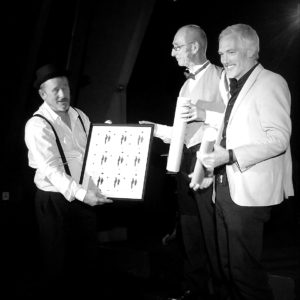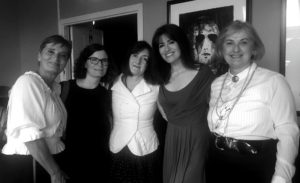I sat in a theatre on the fifth floor of the Henrik Ibsen museum on Bloomsday and pondered about Ireland, as I often do from a distance here in Norway. Ireland is a fundamental part of the making and shaping of me, after all.
Bloomsday is the most Irish of days, celebrated every year all around the globe. It was on that day in 1904 that Joyce and Nora Barnacle went walking together for the first time in Dublin. So special was it to Joyce that he made it the day that everything happens in Ulysses.
The event here in Oslo was organised by a group of Irish people banded together as The Oslo Bloomsday Society, led by a tenacious, irrepressible Galway man called John Fitzgerald. John and the group organise this annual event and reach out beyond Norwegian shores to find scholars and artists to bring us on a great Joycean journey for an evening.
The line-up this year was great. We had a welcome by the second secretary of the Irish Embassy here, leading into a reading of a short essay by an Irish journalist, Audrey Andersen, looking at the connection between James Joyce and the great Norwegian playwright, Henrik Ibsen. An Irish professor and Joycean scholar, Dr. Bartholomew Ryan gave an engaging talk about Ulysses from its perspective as an epic of the human body, focusing on living, dying and the streams of consciousness and emissions that are a part of it all. The evening was rounded off by a great solo performance of an extract from Joyce’s short story, The Dead, performed by Declan Gorman, a Dublin based theatre director and writer.
The obligatory Irish social aspect was vital as always; a drop of wine, or a Guinness if that was your fancy, gorgonzola on bread, and the social chat and banter that we Irish survive and thrive on. I felt immersed in Irishness by the end of it.
With a venue on the fifth floor of the Henrik Ibsen museum in Oslo where Ibsen once lived, it was special because Joyce was famously a huge admirer of Ibsen. Joyce and Ibsen crossed paths by letter, an elderly Ibsen writing to a young Joyce thanking him for a favourable review in a prestigious literary publication and Joyce responding in kind with awed gratitude. Joyce went so far as to learn Norwegian (or Dano-Norwegian as it was at the time) and was able to write to Ibsen in his own tongue some time later to congratulate him on his 73rd birthday.
I’m no Joycean scholar and have found it as difficult as many to penetrate Ulysses in the regular form of reading a book from start to finish. I picked it up, read some pages and put it down many times but I did persevere. The matter of Ulysses polarises Irish people. The poles don’t come from differing views and interpretations on his work but from the very fact that there are people who’ve read it and people who haven’t. I’d wager that the latter is the vast majority if I include here the ones who tried and gave up.
Ulysses is seen as some sort of almost unreadable masterpiece, the preserve of academics and intellectuals because the rest of us are maybe not, how would I put it, dedicated enough, to get through it.
The thing that irks me a bit is that Shakespeare would be in the same category surely, except for the fact that his works are firmly enshrined in the Irish curriculum at secondary school level. Picking up Macbeth or Hamlet for the first time ever is not going to have most people gliding eagerly from page to page, at ease with the evil witches or the floating ghost of King Hamlet. In the school environment, whether we like it or not, we are forced to read, digest, analyse and answer exam questions on these texts. And at the end of the day, we are all the richer for it because we are exposed to a new world of writing, expression and story.
So, what I was wondering about as I sat there in that theatre was, why is Joyce not on the school curriculum in Ireland? There he is, a towering master of Ireland, acknowledged by scholars the world over as a literary giant and we never got the opportunity to study his main literary works at school in Ireland. And it doesn’t seem to have changed since I went to school in the eighties. Henrik Ibsen appears on the current prescribed list for Leaving Cert students in Ireland, along with other greats like Emily Bronté, Brian Friel and Arthur Miller. But no sign of Joyce that I can find. How can that be?
Is it because his texts are too difficult, too cumbersome for the educational authorities to embrace? Is it because his books are still seen as too immoral, his language too obscene, almost a century beyond publication in what we then surely must accept is still a very conservative country? Is it because Joyce overtly rejected Ireland, hating its conservatism and piety? Or is it because Joyce rejected the Roman Catholic Church of his time and its demands for total obedience and subjugation of self?
On a slight aside, the Catholic Church is still deeply ensconced in the education system in Ireland. The recent repeal of the Eight Amendment was a watershed in modern Ireland taking a stance against the conservative ideologies and influence of the Catholic Church. The next seismic shift in an ever-modernising and liberal Ireland is surely a rollback of the Catholic Church in education. The school syllabus is of course set by the civil service but in a country where church and state have historically been so tightly bound, I can’t help but wonder about the influence of the church on the curriculum down through the years.
Let’s face it, school is where we are forced to study literature, regardless of our academic leaning. It’s where we tend to be exposed to and inspired by language, poetry, and literature as well as learning about the people and events that impacted the history of our nation and the world. Surely Ulysses and Joyce should be right up there for the Irish, the same as Tolstoy in Russia and Shakespeare in the UK.
If Ulysses was on a required reading list at school – even choosing some episodes or chapters, instead of the whole book if that would work better – then everybody would at least have some idea about what this masterpiece is about and make a view based on real experience rather than perception. And then every year, as Bloomsday comes around and the world celebrates, it would take away the regret that we haven’t read it or indeed, the need to pretend that we have.







Joyce’s name has been familiar to me but his works for much of my lifetime were very unfamiliar. It wasn’t until I studied British Literature at UiO that his work appeared on my radar. It irked me that he was classified as a British author. «Hey, he is one of ours»- my protective national pride kicking in. Better late than never I suppose.
The absurdity of discovering such a wonderful master of literature in a foreign country wasn’t lost on me. Norwegian students poured themselves over his work with enthusiastic appreciation, quite a few featuring Joyce as the hero of their mastergrad thesis. In light of this, it is hard to argue that his work is impenetrable for native speakers in his native country.
Sitting in my British Lit class in a Norwegian university my heart swelled with pride as we burrowed into Dubliners. It stung a little too. I felt I should have known more, been a step ahead. Joyce’s works were not on my Junior or Leaving Cert syllabus. The realisation set in that his work was no more familiar to me than it was to anybody else in that classroom and my new found burst of pride quelled. It left me feeling a little cheated and embarrassed. While Joyce’s works are deserving of veneration, my ignorance made me acutely aware that the pride, deservedly placed in his work, was very much abstracted from me. There are many who know Joyce well but I can’t count myself among them. I do believe journeying through Joyce’s works at school would have been enlightening. English class unveiled many of what at first glance felt like insurmountable texts but Joyce’s works never made an appearance.
I must admit that I have yet to find the mental shovel to dig my way through Ulysses. It is on my bucket list. Hopefully I won’t kick that bucket before I have conquered the gargantuan book.
A lovely read. Well done! Thought provoking. Keep up the good work.
Hi Laura, thanks for your lovely comment. Really pleased you enjoyed the read.Interesting on a few levels alright that your close encounter was in a British Literature class here in Norway.I think there’s a need to confront why Joyce (aside from some poetry on past curricula) is not taught in Irish schools. What we are afraid of in modern Ireland, I’m not sure. And in terms of reading Ulysses, the Joycean scholar speaking in Oslo this year suggested reading it aloud and giving it a voice, that such verbal expression makes it rich and real and easier to follow. That idea makes a lot of sense to me. Yours, MLM